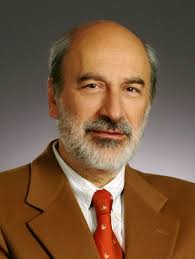A Cognitive Architecture for Object Recognition in Video
by Dr Jose Principe, Distinguished Professor of Electrical Engineering, University of Florida, USA
 |
Abstract:
This talk describes our efforts to abstract from the animal visual system the computational principles to explain images in video. We develop a hierarchical, distributed architecture of dynamical systems that self-organizes to explain the input imagery using an empirical Bayes criterion with sparseness constraints and dual state estimation. The interpretation of the images is mediated through causes that flow top down and change the priors for the bottom up processing. We will present preliminary results in several data sets. |
|
| Biodata:
Jose C. Principe (M’83-SM’90-F’00) is a Distinguished Professor of Electrical and Computer Engineering and Biomedical Engineering at the University of Florida where he teaches advanced signal processing, machine learning and artificial neural networks (ANNs) modeling. He is BellSouth Professor and the Founder and Director of the University of Florida Computational NeuroEngineering Laboratory (CNEL) www.cnel.ufl.edu. His primary area of interest is processing of time varying signals with adaptive neural models. The CNEL Lab has been studying signal and pattern recognition principles based on information theoretic criteria (entropy and mutual information). Dr. Principe is an IEEE Fellow. He was the past Chair of the Technical Committee on Neural Networks of the IEEE Signal Processing Society, Past-President of the International Neural Network Society, and Past-Editor in Chief of the IEEE Transactions on Biomedical Engineering. He is a member of the Advisory Board of the University of Florida Brain Institute. Dr. Principe has more than 700 publications. He directed 87 Ph.D. dissertations and 65 Master theses. He wrote in 2000 an interactive electronic book entitled “Neural and Adaptive Systems” published by John Wiley and Sons and more recently co-authored several books on “Brain Machine Interface Engineering” Morgan and Claypool, “Information Theoretic Learning”, Springer, and “Kernel Adaptive Filtering”, Wiley. |